|
In Tandem Theatre’s latest is a very nuanced family drama in which James Pickering plays a man nearing the end of his life. His wife (Susan Sweeney) and middle-aged son (Simon Jon Provon) deal with a man who is a concave shadow of the man they had known their whole life. On the surface, The Outgoing Tide is a slow metabolic exploration into human drama. A comprehensive synopsis of the basic plot would put anyone to sleep. There isn’t much that actually happens. Go and casually see the drama and you’ll see a bittersweet family drama, but you’ll be missing like...90% of what’s actually going on in the play, which is actually breathtakingly deep...a symphony of nuance that seems to echo in endless depth. And then there’s the fact that it’s about the Alzheimer’s/dementia symptoms that effect 6% of people 65 or older and is the sixth leading cause of death in the U.S. It deals with problems that a growing number of people are having to deal with as baby boomers and their parents advance in age. It’s not anything anyone wants to have to think about. So...The Outgoing Tide is a drama that rewards those willing to think a lot about something no one really wants to think about. So yeah...I don’t envy anyone trying to market this show, but it’s really REALLY good. James Pickering plays a guy named Gunner. We find out over the course of the play that he’s always been really independent. It’s an independence he’s wanted to instill in his son for a long time, but he’s never been able to manage the right finesse--always instigating slightly cruel jokes on his son that are good-natured, but ultimately harmful. Pickering summons a gruff charm about him in the role. This is rally important because he could really come across like a jerk if there wasn’t something there to invite thought about Gunner and who he really is. It’s delicately implicit in and around the edges of the script that Gunner’s always challenging those around him to think for themselves, which is really noble. The way he goes about it is hopelessly gruff, but Pickering constructs a character with enough depth to make him seem positively heroic. The dementia is getting to Gunner and he’s building a very sophisticated endgame for his life in which he’s trying to outsmart his own dementia and sneak his way out of life on his own terms. Simon Jon Provon’s performance is its own kind of heroism. There’s a tremendous amount of thought and planning that’s gone into the Provon’s portrayal of Gunner’s midd-aged son Jack. We’re seeing the character out of his daily life. He’s visiting parents that he’s familiar with without necessarily being very intimate with. He’s going through a divorce and dealing with a teenaged son who doesn’t seem motivated to do much of anything, but that stress rests around the edges of the central drama. So Jack’s exhausted as he goes to visit his parents...echoes of a past which are beginning to dissipate into dementia and loss. The challenge that Provon has to deal with is making an emotionally exhausted man feel dramatically dynamic in a slow-moving plot. Any actor would want to amp-up the affect to keep the character from feeling dramatically flat, but anything more than what Provon brings to the stage here would feel totally out-of-synch with the character. It’s an admirably reserved kind of energy that he’s bringing to the stage here. Susan Sweeney plays a character who is heroic in her own way. Like Provon, she has to mute her overall frustration in character. Gunner’s wife Peg has been dealing with his relentlessly progressive dementia for weeks that are going to feel like years. She’s very upset over Gunner’s stubbornness and so...like Provon, she’s playing someone without the energy to be toweringly dramatic. The man Peg’s spent her life with is dying...anyone would WANT to break out into a heavy Shakespearian drama-mode but real life isn’t like that...and The Outgoing Tide is real life made moodily poetic for the stage. There’s a visceral quality to the emotion that Sweeney delivers quite well. Peg had been very young when she met and married Gunner. There had been the possibility of a carer in teaching. Instead she ended up taking care of people her whole life. And now the last person she’s taken care of is about to make his exit and she doesn’t know what to do about it. Sweeney has a gentle passion about her that serves the character well. She’s allowed the strongest visible emotions onstage and it’s to her credit that she doesn’t try to make them any more explosive than they are. As with everyone else onstage, Sweeney is very careful not to be too explosive. Director Chris Flieller has worked with the ensemble here to deliver a very thoughtful kind of moodiness about the drama. Flieller is great with comedy. Punchlines are easy. It takes a lot of courage to go for something infinitely more subtle and nuanced like this. In Tandem Theatre’s production of The Outgoing Tide runs through March 18th at the Tenth Street Theatre on 628 N. 10th St. For ticket reservations and more, visit In Tandem online.
2 Comments
An Audience Onstage Once More Leda Hoffmann has everyone onstage for Marquette’s production of Student Body. It’s been happening a lot lately. Greendale Community Theatre did it a little while back with [title of show]. Just last week Cooperative Performance did it at Alverno with Ellis. Hoffmann is particularly bold given the nature of the play. The stage at Marquette’s Helfaer Theatre is modest for a bigger theater to begin with. Get everyone onstage and it’s remarkably cozy. Here characters, actors and audience all hang out onstage in a one-hour drama that feels like a much more intellectually confrontational take on 12 Angry Men. For one hour, there’s nowhere to hide for any of us. We all have to take a look a ourselves and it’s not going to be pretty. The Role of A One-Hour Conversation Will Be Played By... A One-Hour Conversation Oh...and it’s a play set in a college theatre for one hour. As audience and actors, WE are onstage for one hour. The cast of ten is really, really good. The big problem I have with Twelve Angry Men is that it’s Twelve Angry Men. Big questions of guilt, innocence and justice NEED to be an all-inclusive discussion. That’s a big reason why I think this is a much more relevant work than its predecessor. It’s reassuring to see a group of ten young actors navigate the linguistic complexities of a passionate one-hour conversation that rolls through many twists and turns over the course of an hour. The characters’ arrival at the beginning of the play are staggered, but for the most part this is ten actors all onstage for a full hour, which means that everyone in the cast needs to stay in character for a full hour even when they’re not actually saying anything. In a studio theatre setting, it can be really obvious when people slip out of character for even a moment even when the direction of the dramatic action is nowhere near them. Sexual Assault Playwright Frank Winters’ Student Body stages an extremely frustrating situation. A group of students have shown-up at a college theatre to discuss whether or not video footage of a sexual assault at a party should be handed-in to the police. Unlike Marquette, it’s a small town college. Everyone has a different relationship to the events at the party. Everyone’s at least a bystander by the end of the play, even if only in being a part of a group of people who could bring the footage to the authorities. Every one in the audience is going to have a slightly different perspective on the matter. I realize the playwright is trying to show the complexities of the matter, but as a father of a couple of girls who are going to be in college in a little over a decade, I want it to be every simple as it seems on the surface. A crime has been committed. The authorities need to know about it. It’s the only way this sort of thing can be properly addressed. Otherwise all we get is the smug face of Brock Turner staring back at us as a society. The footage should be handed over. Isn’t it that simple? Please? Winters’ script covers the sophisticated web of problems surrounding the issue while still managing to keep it feeling very natural and organic. Hoffmann does a really good job of pointing us as an audience at this thing and making sure that we’re all paying really close attention to it. One Hour and One SD Card (and possibly one big spoiler) On a very physical and superficial level, the play is one hour of dramatic conversation between ten actors playing ten characters seen by an audience. On a purely physical level, it all involves a video file on a single SD card. It’s a piece of plastic 15 mm x 11 mm x 1 mm. A prop that small would get lost on the stage of anything other than a studio theatre. With cast and audience onstage at the Helfaer, it’s small enough to seem perilously tiny without being so small as to be totally immaterial. The fates of victim, perpetrator and bystanders all rest on a tiny piece of plastic. It’s a very potent visual. Rene Leech holds it in her hand at one point. She’s playing Liz. Liz is a very assertive voice in the ensemble and Leech does a really good job with that towering assertiveness. In Leech’s hands, Liz is an authority onstage. She pulls the SD card out of the camera and the tension in the room goes up a few hundred degrees. Marquette University’s production of Student Body runs through Feb. 25 at the Helfaer Theatre on 525 N. 13th St. A concise and comprehensive review of the show runs in the next print edition of the Shepherd-Express. For ticket reservations, visit Marquette online. Somewhere in the middle of it all, Henry V walked into the front row, shook my hand and asked me if I was ready for battle. I smiled and nodded. It was a gesture that was as empty as a box of tennis balls. Because it wasn’t really Henry V who wasn’t really asking me to go into battle. But it was one hell of an experience being asked to go into battle like that. It may not have amounted to much in and of itself, but it was precisely the type of clever connection that Bard & Bourbon manages with some of its sharper moments in its latest offering. A King In Woods The man who was actually shaking my hand and looking deeply into my eyes with a steely charisma was Zach Thomas Woods...an explosively energetic, young actor playing the role of a man who launched England to war with France and led them to victory in the Battle of Agincourt. Woods lives up to the power of the legend of a Shakespearian hero. He trembles with strength in accepting the crown. He carries a high-gravity approachability when delivering the St. Crispin’s Day Speech in launching troops into battle. The deeper stuff, more conflicted stuff, though, is always a bit more tricky with Shakespeare. The script doesn’t allow for the right kind of distance to truly explore the travesty of inequality between nobles and commoners that echoes into today with the ever-growing divide between wealth and poverty. Shakespeare’s address of the greater complexities in the horrors of war and such never have a chance to come into full resolution in a production that is otherwise a great deal of fun. Woods does a noble job of delivering conflict as Henry struggles with internal uncertainties in leading the troops into France, but it is a noble job. It’s very difficult to deliver on the deeper problems of war in a script that also celebrates the legend of one nation’s victory over another. DeWolff Directs...Directly Rather than grapple with the deeper problems at the heart of the script, director Grace DeWolff directs the focus of the play on interpersonal dramas one scene at a time. The British are in red. The French are in blue. There’s a cultural divide. Nationality is acknowledged...as is the divide the distances noble blood from commoners, but DeWolff cannily shrugs off bigger concerns for the drama of those present onstage. It serves the production well. On an intimate stage, all we have in the space are the individuals who have loves and fears and hatreds and so on. A Rather Nicely Doubled Duecker In a play of individuals, Susie Duecker plays a couple of different characters who find themselves in the unenviable position of being drawn against the king...initially in the role of the French Herald Montjoy who delivers the tennis balls to Hernry and then later-on as Michael Williams, who unwittingly picks a fight with the Henry prior to the big Battle of Agincourt. Duecker is smartly poised from a couple of different angles playing a couple of different people who are in way over their heads. It’s a memorable pairing for Duecker. (She also plays Bedford and the French King, but I really like the Moujoy/Williams pairing. It’s fun.) Laude Ad Vance* It helps that DeWolff is working with a great cast. LeAnn Vance manages some sophisticated moments with a few different characters, but she’s positively magnetic as the Chorus. It’s difficult to pinpoint what makes her work in the show’s narration work as well as it does. Her voice never reaches for any overwhelming sense of authority. Nor does it reach for a cloyingly ingratiating friendliness. Vance is just...really cool. She sets the scene with beautifully pragmatic tones. (So cool.) LaBelle Belle En Français The specifics of culture exist around the edges of the production, but that doesn’t mean that it doesn’t openly embrace the French En Français. Jeremy James LaBelle and Ashey Retzlaff are strikingly delightful as Alice and Catherine. The English tutorial scene is great fun. Retzlaff’s charming French is matched by LaBelle’s subtly witty sense of authority with the language. When Woods gets tossed into the mix attempting to woo Catherine the fun manages a gallantly tenuous charm about it. And Always...There Is Drinking The play plays out in a cozy subterranean space with a bottle bar. Nothing on tap, but the Under Ground Collaborative’s Matt Kemple keeps some rather nice beer behind the bar including a classy microbrew or two. This allows the audience to drink along with Shakespeare in style. This is Bard & Bourbon. Every performance features a different actor knocking back several shots of liquor before, during (and possible after) the performance. Opening night it was Christopher Braunschweig...a large and towering man who plays...like...five different supporting roles over the course of the play. With a casually engaging fire behind his eyes, Braunschweig has an innate appeal that’s at least 10/12 as tall as he is. He knocked back...a lot of liquor last night...over the course of the evening that comic mumbling under his breath became ever more pronounced. Thankfully, Braunschwieg seems totally incapable of being annoying about that sort of thing onstage. Bard & Bourbon’s Henry V (drunk) runs through Feb. 17 at the Underground Collaborative on 161 W. Wisconsin Ave. For ticket reservations and more, visit Bard and Bourbon online. *(probably not quite Latin, but I like it.) William Shakespeare is a towering literary legend. It can be really, really difficult to portray a guy like him as a flesh-and-blood person who once ate, slept and had a family. In his drama Equivocation Bill Cain opens with a meeting. There’s Shakespeare being given a commission for a play he doesn’t want to write. This month the drama resonates into the Next Act Theatre. Mark Ulrich sits there at the opening of the play in the center of the stage as “Shag.” He’s being asked to write about the recent past. The Gunpowder Plot would make for interesting drama, but “current events” simply aren’t done onstage. Shakespeare doesn’t want to do it. Ulrich inhabits a kind of passionate exhaustion in the role of Shakespeare that’s present from that very first moment. It brings the legend down to earth so as to elevate his passions into something far more electrifying than some stuffy, old legend about a guy who wrote plays a few hundred years ago. The villain of the story is the man giving Shakespeare the commission. He’s a nobleman who speaks for the king...and the king wants a story about the Gunpowder Plot. He’s played with a deft and brutal wit by David Cecsarini. In the course of the drama, we see the character slice through a very precise character arc that Cecsarini manages with impressive emotional precision. Shakespeare is coerced into bringing the project back to The Globe for development. Director Michael Cotey gives The Globe an earthiness with an excellent cast playing an excellent cast. Milwaukee stage veteran Jonathan Smoots plays a veteran Globe actor Richard Burbage...a professional who clashes with Shakespeare throughout the story. Smoots’ chiseled charisma serves the role well. He also plays Father Henry Garnet--a Jesuit priest implicated in the plot. Shakespeare drags himself to see the man in the interest of getting the story right and gets more than he would have expected in a story that manages to remain totally compelling for a solid 3 hours onstage. Always a welcome presence in anything to do with Shakespeare, T. Stacy Hicks is delightful in a few different roles. He’s perfectly-cast as one of Shakespeare’s players. Josh Krause is excellent in the role of an actor as well, but he’s at his best here in the role of King James I--played here as a particularly jovial and playful Scotsman. Eva Nimmer smartly plays the most clever component of the cast--Shakespeare’s daughter Judith. She hates soliloquies and so therefore is the only one who speaks directly to the audience. Shakespeare’s challenge is to write a drama about people who haven’t died yet. There's honesty, there's respect, there's duty and..then there's the play. There are political concerns constricting everything. Shakespeare becomes investigator and journalist as well as actor and playwright. Family drama and very topical concerns about the nature of truth loom into view. Cherry pick what you want for the release of some damned self-serving memo and label anything you don’t like as fake news, but you’re doing a severe disservice to the people you want to tower over. More than simply historical, Equivocation is an important exploration into the importance of getting the story right...not just for now, but for those people who have to live with the stories we tell once we’re gone. Next Act’s production of Equivocation runs through Feb. 25 at Next Act’s space on 255 S. Water St. For more information visit Next Act online. 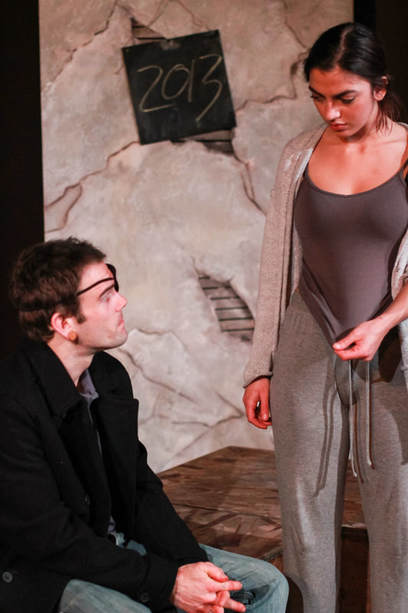 Life is a way of collecting love and injuries. The Constructivists explore this on one of the coldest weekends of the year as they present Rajiv Joseph’s comedic drama Gruesome Playground Injuries. Scenes from a couple of somewhat fictional lives glance through light and shadow in a warm and cozy, little subterranean stage downtown. Two people intermittently meet in non-linear moments from the end of one millennium and the beginning of the next and back again. There’s love and concern. There’s pain and loss. There’s a beautifully fragmented human connection that materializes as time passes. (Roughly 90 minutes without intermission.) Designer Sarah Harris’ set presents the drama in front of a group of large, monolithic slabs made to look like cracking plaster. There are a few wooden beams visible. The year of any given scene is written by one of the two actors in chalk on a little blackboard painted onto a central rear wall. Harris also assembled the wardrobe, which scatters a clever style from childhoods at the end of the ’80s to adulthoods somewhere in the present. In the sonic background of it all, there’s the persistent melody of Phil Collins’ 1988 cover of, “Groovy Kind of Love,” mixing with fragments of various other songs. Solana Ramírez-García is hauntingly earthbound as Kayleen. There’s a restlessly still silence about her. Kayleen is quietly enduring some overwhelmingly intense stress in her life. Ramírez-García delicately treads a fine line in characterization. The character wants someone to emotionally open-up to, but she might not want to actually go through the business of opening-up. The character seems to want to show just enough strength to show people the fact that she’s enduring casual horrors. Maybe she’s just sitting there or maybe she’s just lamenting the lack of maturity of her companion, but underneath it all that is summoned to the stage with Ramírez-García’s distinctively beautiful voice. There's a subtle Latin American lilt in her voice that adds character to the overall aesthetic of the production. Rob Schreiner plays the guy who is falling in love with Kayleen. A guy named Doug. Doug is accident-prone. He’s a student. He’s a hockey player. Later-on he’s a claims adjuster. He’s irrepressibly positive about everything. He’s always walking into a scene with a different injury from a different off-stage encounter with risk, misfortune or both. Schreiner does a good job with Doug. There’s no doubting his overall nice-guy charisma decked-out in rugged street clothes, a few tattoos and flesh-colored plug retainers. Schreiner manages the tricky business of seeming resilient in the face of constant injury without compromising Doug’s personality. He’s going to be there for Kayleen no matter what. Schriener’s earnestness keeps this from ever coming across as anything other than compassionate. It’s not weird. It’s not creepy. It’s not emotionally imbalanced. It’s just Doug. And Doug’s a nice guy. Schreiner makes it look easy. It’s almost as fun watching scenes change as it is watching them play out. We see the whole process of going from one scene to the other between scripted moments as two actors share the small stage with two characters moving from one moment in the past 30 years to another. They’re changing from one set of clothes to another. Schreiner changes the make-up from one injury to the other. Actors re-center themselves from one point in the characters’ lives to another. This is fascinating on one of the most intimate studio theatre spaces in town...you can see two actors and two characters sharing a moment in passing between nearly every scene where Ramírez-García and Schreiner look at each other for a brief second before the scene starts. The actor and character from on face glances at the actor and character from another face. In one unspoken moment they set the emotional stage for the next moment that they’re going to play through. As an audience we get to see the process behind the process. We’re seeing actors and characters in very emotionally intimate and vulnerable moments. It’s quite an experience. Director Jaimelyn Gray establishes a very dynamic gravity for The Constructivists’ first show. It’s a really sophisticated juxtaposition of actors, characters and audience in a comfortable space that explores some of the deeper end of human emotion without faltering, fumbling or overreaching. An excellent first outing for the group. Too bad the show only runs for one weekend. The Constructivists’ production of Gruesome Playground Injuries runs through Feb. 4 at the Underground Collaborative on 161 W. Wisconsin Ave. For more information, visit The Constructivists Online, |
Russ BickerstaffArchives
July 2024
Categories |
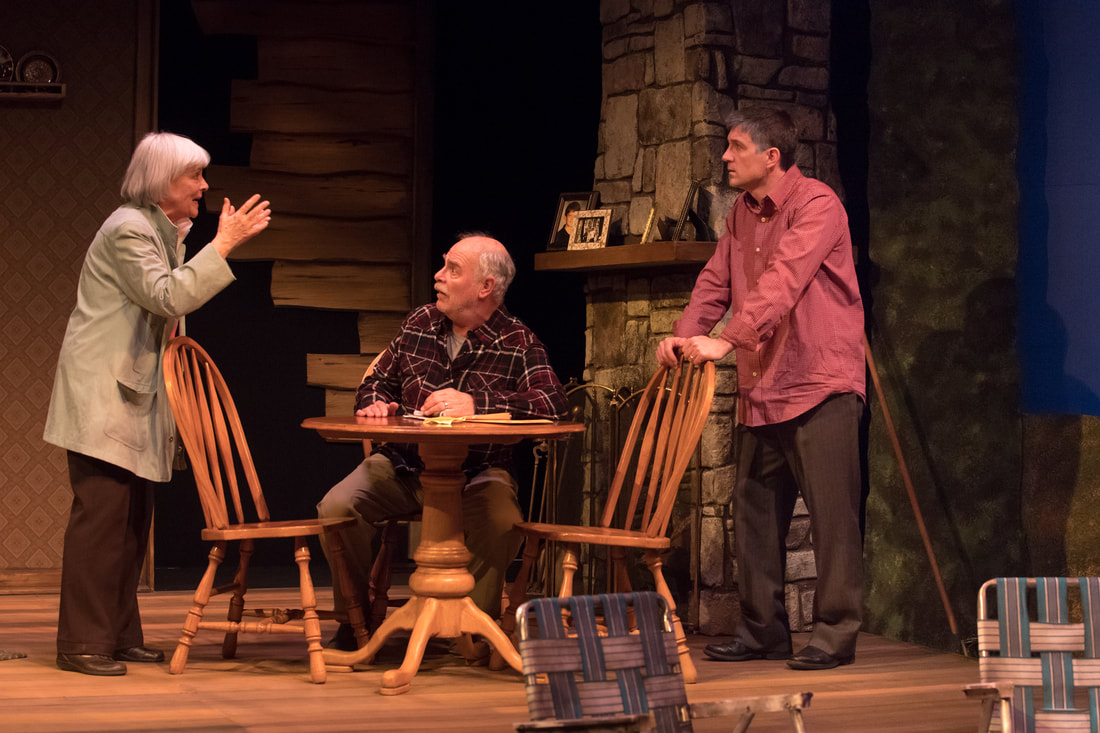
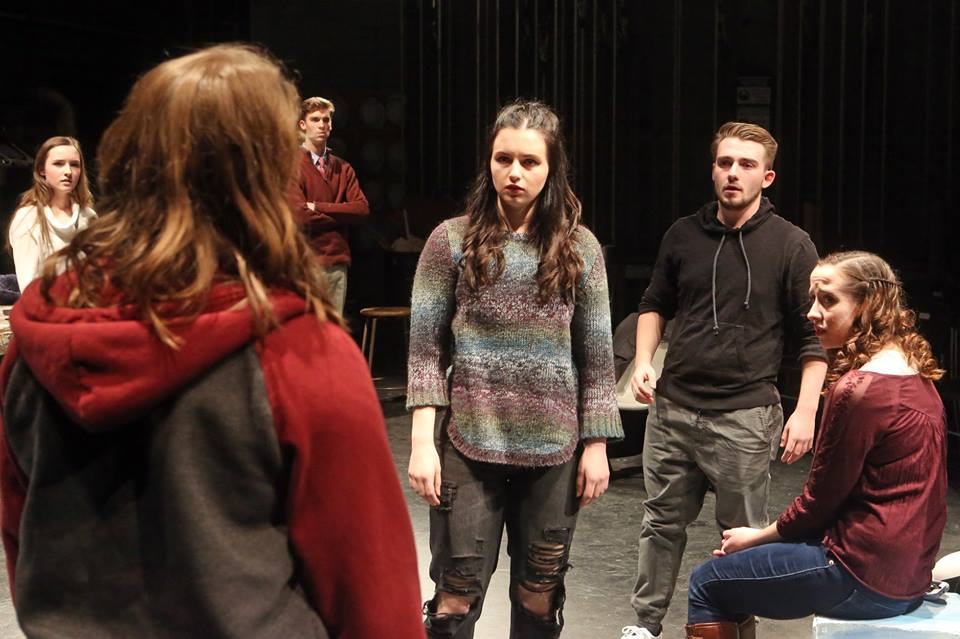
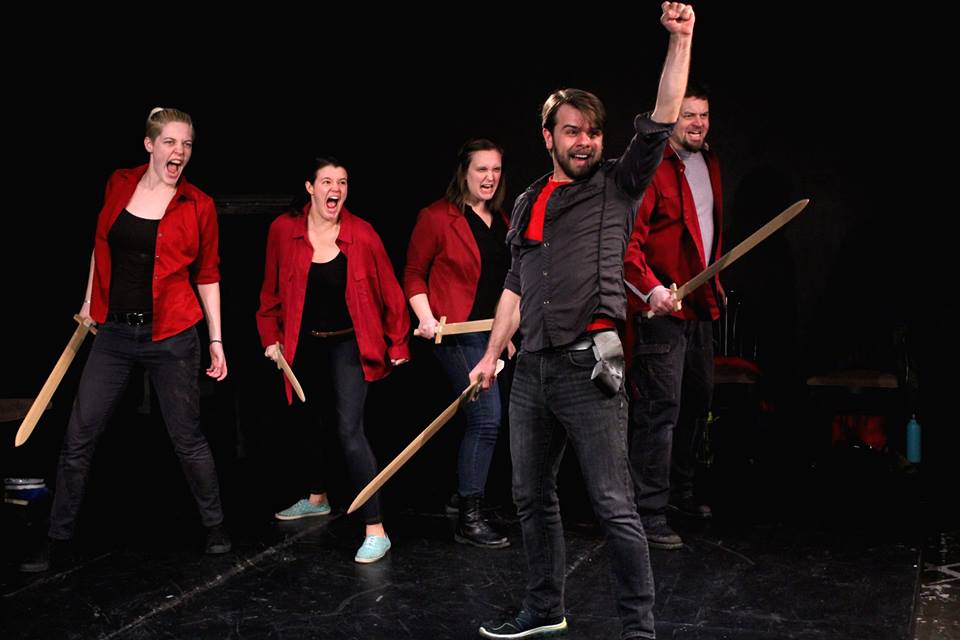
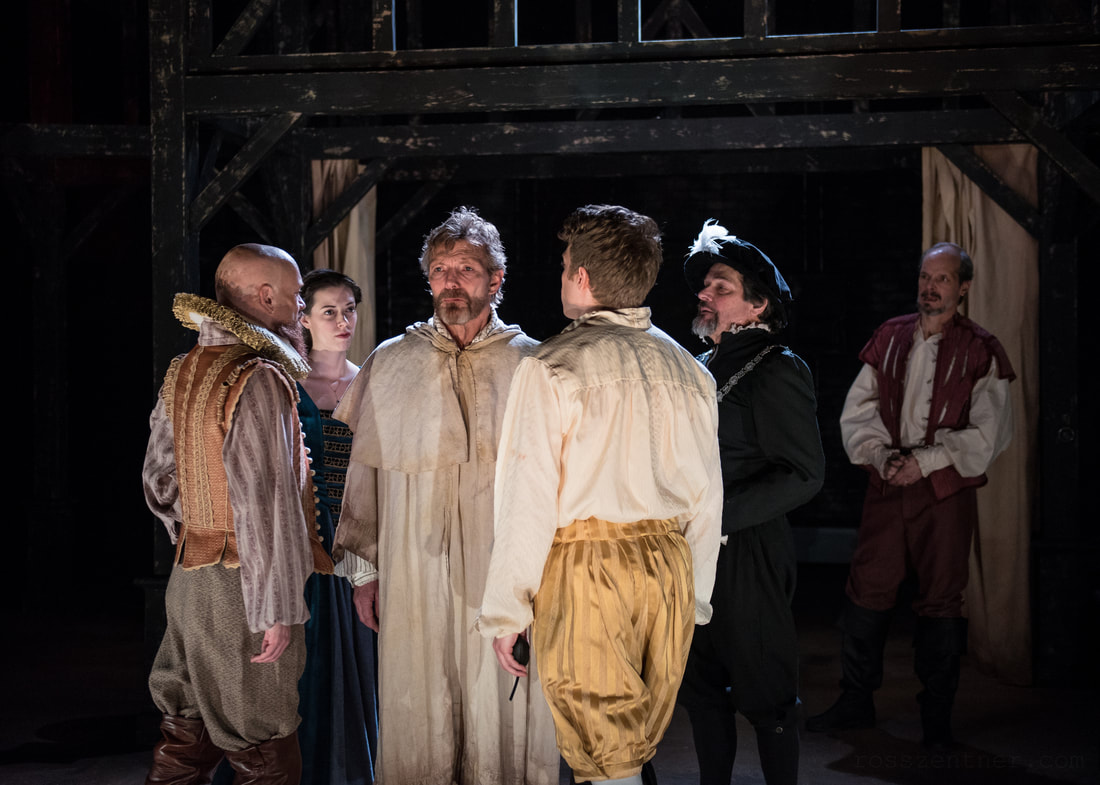
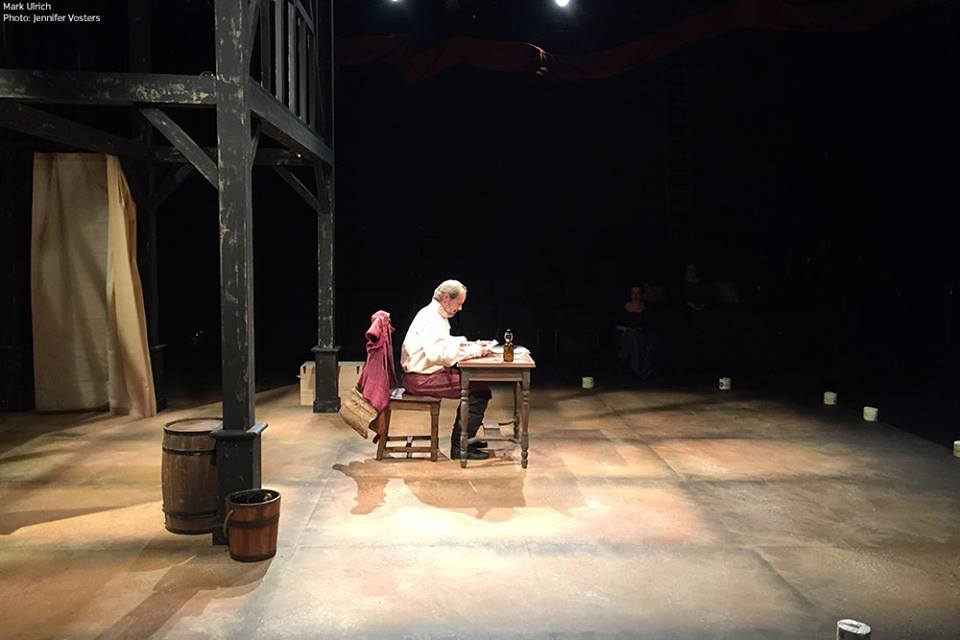
 RSS Feed
RSS Feed
